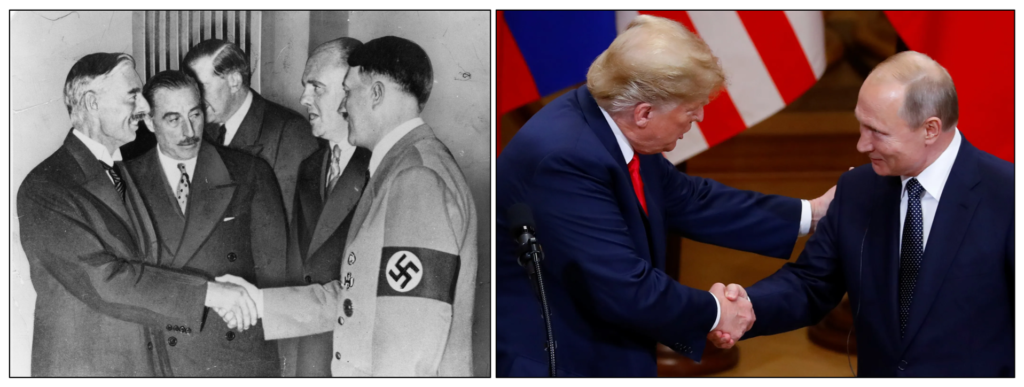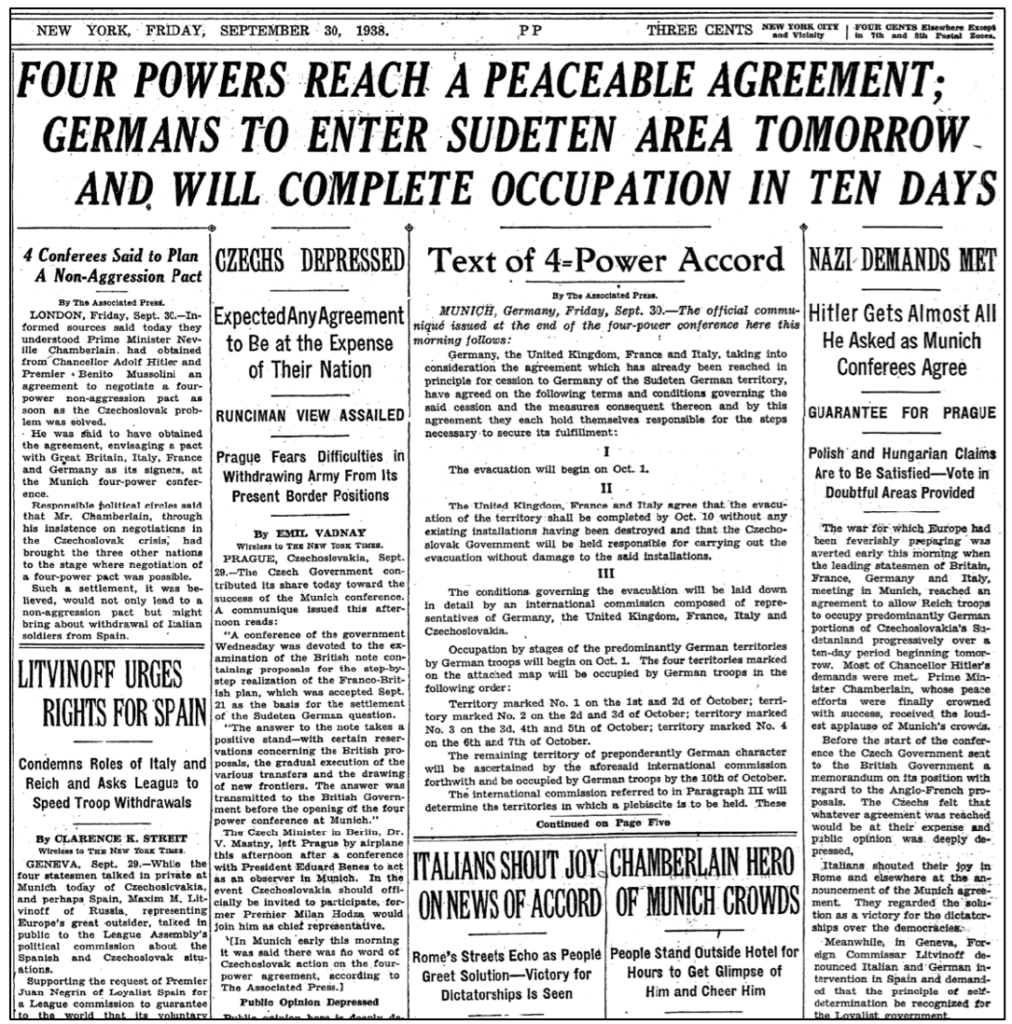Munich II: Trump Begins the U.S. Betrayal of Ukraine

In the wake of Secretary of State Marco Rubio’s meeting with his Russian counterparts in Saudi Arabia Tuesday, defenders of freedom worldwide can be forgiven for thinking they had seen this horror story before.
After all, an expansionist European power pressed its claim to the territory of another sovereign nation in part based on the supposed mistreatment of its ethnic brethren wrongly consigned to living within the borders of that newly independent state. With its large and well-armed military, the smaller country was determined to defend itself against the aggressor, its people resolved to endure unimaginable sacrifices in a war for national survival. And standing behind it was an alliance of Western powers whose combined military might and superior economic strength provided the means to stop the tyrant’s annexationist march dead in its tracks.
If that sounds eerily familiar, it should. Just swap 1938 for 2025, Czechoslovakia for Ukraine, the Sudetenland for Donetsk, Luhansk and Crimea, Hitler for Putin, Germany for Russia, the UK and France for the United States, and Neville Chamberlain for Donald Trump.
Like Prime Minister Chamberlain before him, President Trump made clear that he was prepared to sell Ukraine down the river. Last month, Trump told Sean Hannity of Fox News that “Zelenskyy was fighting a much bigger entity, much bigger, much more powerful. He shouldn’t have done that, because we could have made a deal.” Yesterday, the President took his revisionist history a step further, blaming Ukraine for Russia’s invasion of the country in February 2022 (an invasion Trump at the time called “savvy” and “genius”):
“You should have never started it. You could have made a deal. I could have made a deal for Ukraine that would have given them almost all of the land, everything, almost all of the land, and no people would have been killed, and no city would have been demolished, and not one dome would have been knocked down. But they chose not to do it that way." [Emphasis mine]
As Rubio, National Security Adviser Mike Walz and Special Envoy headed to Riyadh to meet with their Russian counterparts, Trump complete undercut the Ukrainian position. In Munich last week, Defense Secretary Pete Hegseth told European leaders that any notion of restoring Kyiv’s pre-war borders was “unrealistic” and an “illusory goal.” Why would an American President support Moscow’s position before the first supposed peace talks even began? Because, Trump explained after his phone call with President Vladimir Putin last week, Russia had already sacrificed so much for it:
“[Russia] took a lot of land and they fought for that land and they lost a lot of soldiers.”
Veteran diplomat Carl Bildt of Sweden, which only joined NATO after Putin’s aggression against Ukraine, responded to Trump’s jaw-dropping comments with shock and disdain:
"It's certainly an innovative approach to a negotiation to make very major concessions even before they have started. Not even Chamberlain went that low in 1938. That Munich ended very bad anyhow."
Very badly indeed.
As Lynne Olson wrote in the New York Times regarding the appeasement of Hitler by British Prime Minister Neville Chamberlain:
Chamberlain clung to that delusion even as Hitler annexed Austria in March 1938 and, two months later, demanded that Czechoslovakia, Eastern Europe’s only democracy, surrender the Sudetenland, a vital area containing most of the country’s formidable defense fortifications and major centers of industry. Czechoslovakia refused and mobilized its highly trained, well-equipped army to counter a German invasion; France, which had a military treaty with the Czechs, did the same.
In the fall of 1938, the million-man Czech army backed by the 100 divisions of the French armed forces and whatever England could mobilize had the muscle and the motivation to stop Nazi Germany’s threatened onslaught. When asked at his postwar trial whether German forces could have defeated a united front of Britain, France and Czechoslovakia in 1938, Gen. Alfred Jodl, chief of the German Army, replied, “It was out of the question.”
But unprepared for war and mindful of the generation Britain lost in the fields of Flanders 20 years earlier, Chamberlain recoiled at the prospect of a conflict with Hitler that Churchill and others knew was coming. He convinced himself, Olson wrote, “that if he dealt with Hitler in a ‘practical and businesslike’ way, he could convince the Führer of the efficacy of peace and bring him to heel.”
Of course, Chamberlain didn’t bring Hitler to heel. At the four-power conference in Munich on September 29 and 30, Britain and France acceded to virtually all of Hitler’s demands. In the absence of Czech Prime Minister Edvard Beneš or any other Czech representatives, Chamberlain and French Premier Édouard Daladier handed over the Sudetenland and its three million German speaking residents to the Third Reich. The headlines in the New York Times on September 30, 1938 horrifyingly foreshadowed developments in Munich and Riyadh over the past two weeks. The occupation would be complete in 10 days as “Nazi Demands Met” and “Hitler Gets Almost All He Asked as Munich Conferees Agree.” “Czechs Depressed,” the Times reported, as they “Expected Any Agreement to Be at Expense of Their Nation.”

As for British Prime Minister, the Times announced, “Chamberlain Hero of Munich Crowds” as “People Stand Outside Hotel for Hours to Get Glimpse of Him and Cheer for Him.” If that, too, sounds familiar, it should. A Politico headline from February 18, 2025 reads, “Moscow’s media Gloats Over US-Russia Talks.”
As for Beneš and the Czechs, they were certainly right to worry that the Munich agreement would come at the expense of their nation. Hitler, after all, had warned that “the conditions in this nation are unbearable” and that “politically more than 3,500,000 [German] people were robbed in the name of the right of [Czech] self-determination.” After fabricating tales of 300 Sudeten Germans being tortured and killed by the Czechs, Hitler was obviously lying when he told the world on September 26, 1938, “The Sudetenland is the last territorial demand I have to make in Europe.” In the wake of the territorial surrenders to the Germans, Poles and Hungarians, Beneš resigned in October 1938. Finally on March 15, 1939, Hitler violated the Munich pact as his troops invaded the remainder of Czechoslovakia.
Less than six months later, Chamberlain’s policy of appeasement was in complete ruins as the Wehrmacht swept into Poland. By June 1940, Norway, Belgium, Holland and most of France were in German hands and Chamberlain’s England stood alone.
The echoes of the Western allies Munich disaster still ring 87 years later. Russian Foreign Minister Sergei Lavrov declared there could be “no thought of” territorial concessions to “what is now called Ukraine.” In January, Lavrov laughably claimed that Russia's war against Ukraine is defensive and aimed at protecting Russian-speaking populations. “We ultimately launched the special military operation,” he said, “to protect our security interests and the interests of the Russian people in Ukraine.” And those ethnic Russians, Putin insisted last year, must now be considered part of the Russian Federation. As a condition for peace negotiations, Ukrainian troops must leave Donetsk, Luhansk, Kherson and Zaporizhzhia oblasts.
And by every indication, President Donald Trump is just fine with that. After his envoys left Ukraine and America’s NATO allies out of the first round of talks with Putin’s team in Saudi Arabia, Trump blasted the Ukrainian President as a “dictator” and warned, “Zelenskyy better move fast or he is not going to have a Country left.” While Ukrainian forces have launched a counteroffensive to try to offset recent Russian advances, Secretary of State Rubio is already talking about a new Russian-American relationship after the dust settles in what may remain of Ukraine. As the New York Times reported, Rubio announced Moscow and Washington are already looking to end restrictions on each other’s embassies.
And finally, he said, Russia and the United States would explore new partnerships, both in geopolitics and in business. He described them as “the extraordinary opportunities that exist should this conflict come to an acceptable end.”
To borrow from Neville Chamberlain, Trump apparently believes that if he dealt with Putin in a ‘practical and businesslike’ way, he could convince the former KGB man turned Russian President of the efficacy of peace and bring him to heel.
America’s stunned European allies are laboring under no such misapprehension. Fearful of an American betrayal of Kyiv that could leave it helpless in the face of renewed assault by a rested and replenished Russian military, French President Emmanuel Macron and British Prime Minister Keir Starmer have discussed dispatching thousands of troops to guarantee any peace agreement. And facing the very real prospect that Donald Trump’s abdication of America’s 80-year security role in Europe could lead to the U.S. abandonment of NATO, our allies may well have to go it alone. A nightmare European future in which the Russian Federation completes the annexation of Ukraine, returns to Moldova and the Baltic states, and completes an Anschluss with Belarus could well be in the offing.
Meanwhile, according to four Western intelligence officials and two U.S. congressional officials interviewed by NBC News, “intelligence from the United States and close allies shows that Russian President Vladimir Putin still wants to control all of Ukraine.” With Trump already conceding both that Moscow will keep the territory it has seized and that Ukraine will not gain NATO membership, one of the officials lamented, Putin’s “goals remain maximalist.”
Or to borrow from Adolf Hitler after the Munich Conference, Crimea and eastern Ukraine is not the last territorial demand Vladimir Putin has to make in Europe. For his part, Neville Chamberlain could perhaps be forgiven his naivete and his cowardice in 1938. But now, with everything the Ukrainian people have already endured to secure the survival of their nation, for his betrayal of America’s allies in Kyiv and across Europe, Donald Trump should be “damned in time and in eternity.”

